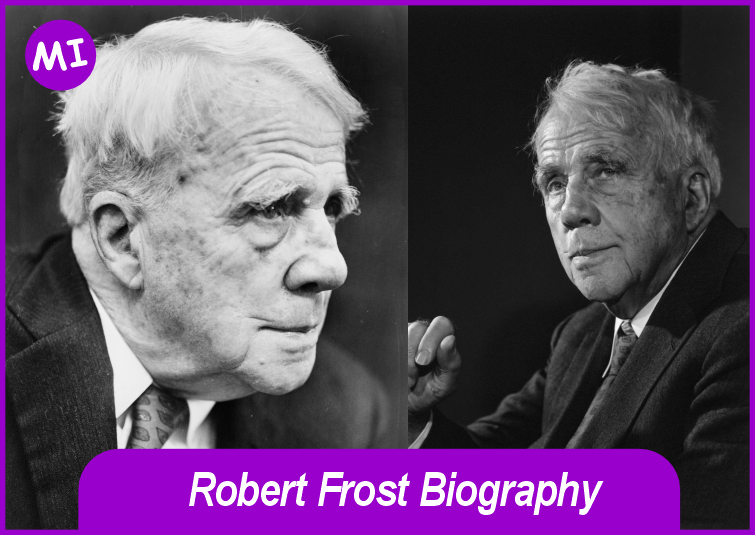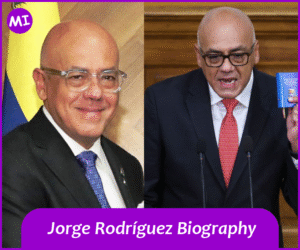
Robert Frost Biography – Explore the life and legacy of Robert Frost, one of America’s most celebrated poets. Learn about his early life, famous works, family, education, career achievements, and timeless poetry, including The Road Not Taken and Stopping by Woods on a Snowy Evening.
Robert Frost remains one of the most iconic and influential poets in American literature. Known for his deep connection to nature and rural life, Frost’s poetry beautifully captures human emotions, life choices, and the complexity of existence. His works, including The Road Not Taken, Fire and Ice, and Stopping by Woods on a Snowy Evening, continue to be studied and admired worldwide.
Robert Frost Biography: Profile Summary
| Field | Details |
|---|---|
| Full Name | Robert Lee Frost |
| Date of Birth | March 26, 1874 |
| Place of Birth | San Francisco, California, USA |
| Date of Death | January 29, 1963 |
| Place of Death | Boston, Massachusetts, USA |
| Nationality | American |
| Occupations | Poet, Playwright, Teacher, Lecturer |
| Education | Attended Dartmouth College (~2 mo), Harvard University (~2 yrs); no degree achieved |
| Early Career | First poem published in The Independent (1894); taught school and farmed in New Hampshire (1900–1909) |
| Breakthrough | Moved to England in 1912; published A Boy’s Will (1913) and North of Boston (1914); established via Ezra Pound support |
| Awards & Honors | Four-time Pulitzer Prize winner (1924, 1931, 1937, 1943); 1960 Congressional Gold Medal; Poet Laureate of Vermont (1961); served as Consultant in Poetry to Library of Congress (1958–59) |
| Notable Works | A Boy’s Will, North of Boston, Mountain Interval, New Hampshire, A Witness Tree |
| Legacy & Influence | Known for realistic portrayals of rural New England and philosophical themes; first poet to read at a presidential inauguration (Kennedy, 1961); designated as a major public literary figure |
| Cultural Persona | Cultivated a folk-wise rural image while actually being well-educated and literarily sophisticated; described as a “trickster” with layered meanings in poetry |
| Net Worth | Estimated between $10 million and $85 million, with varied assessments: $10–15 M (Study of assets/royalties) and $85 M (celebrity net‑worth estimates) |
Important Facts
- Renowned Poet: Robert Frost is one of the most celebrated poets in American history.
- Pulitzer Prize Winner: He won the Pulitzer Prize for Poetry four times, a rare achievement.
- Educational Background: Attended Dartmouth College and Harvard University but did not complete a degree.
- Famous Works: Some of his best-known poems include The Road Not Taken, Fire and Ice, and Stopping by Woods on a Snowy Evening.
- Presidential Recognition: He was honored by President John F. Kennedy and spoke at his inauguration in 1961.
Early Life and Education
Robert Frost was born on March 26, 1874, in San Francisco, California, to William Prescott Frost Jr. and Isabelle Moodie. After his father’s death in 1885, the family moved to Lawrence, Massachusetts, where Frost developed a love for poetry. He attended Dartmouth College for a short period but soon left to work and explore writing. Later, he studied at Harvard University but did not complete a degree. Despite his lack of formal academic credentials, Frost’s deep literary knowledge and talent made him a legendary figure in poetry.
Career Beginnings and Breakthrough
Frost initially worked as a teacher and farmer while continuing to write poetry. His big break came when he moved to England in 1912, where he published his first poetry collection, A Boy’s Will (1913), followed by North of Boston (1914). These works earned him critical acclaim and introduced him to literary greats like Ezra Pound.
Rise to Prominence
After returning to the United States in 1915, Frost’s reputation grew rapidly. He became a beloved figure in American poetry, known for his accessible yet profound style. His works often explored themes of nature, human choice, and personal reflection. Poems like The Road Not Taken and Mending Wall became part of American literary tradition and are frequently studied in schools.
Famous Poems and Their Meaning
- The Road Not Taken (1916) – A meditation on choices and their impact on life.
- Fire and Ice (1920) – A reflection on how the world might end, symbolizing destruction through passion or hatred.
- Stopping by Woods on a Snowy Evening (1923) – A quiet contemplation of nature, life, and duty.
- Mending Wall (1914) – Explores themes of boundaries and human relationships.
Career Achievements and Accomplishments
Throughout his lifetime, Robert Frost received numerous accolades:
- Four Pulitzer Prizes for Poetry (1924, 1931, 1937, 1943).
- Congressional Gold Medal awarded by President John F. Kennedy in 1962.
- Poet Laureate of Vermont in 1961.
- Spoke at President Kennedy’s Inauguration in 1961, becoming the first poet to do so.
Personal Life and Family
Frost married Elinor Miriam White in 1895, and they had six children together. His personal life was marked by tragedy, as he lost several children and his wife before his own passing in 1963. Despite personal struggles, his work remained a beacon of wisdom and reflection on human nature.
Death and Legacy
Robert Frost passed away on January 29, 1963, at the age of 88. His legacy continues to thrive, with his poetry still widely read, analyzed, and appreciated. His contributions to American literature remain unmatched, and his works are part of school curricula worldwide.
Conclusion
Robert Frost’s poetry transcends time, offering profound insights into life, choices, and nature. His ability to craft simple yet deep narratives has made him a literary legend. With multiple Pulitzer Prizes and a lasting impact on poetry, Frost remains an integral figure in American literary history.
FAQs About Robert Frost
1. What is Robert Frost best known for?
He is best known for his poetry, including The Road Not Taken, Fire and Ice, and Stopping by Woods on a Snowy Evening.
2. How many Pulitzer Prizes did Robert Frost win?
He won the Pulitzer Prize for Poetry four times.
3. Did Robert Frost have formal education?
He attended Dartmouth College and Harvard University but did not earn a degree.
4. What was Robert Frost’s writing style?
His style combined traditional verse with modern themes, often focusing on rural life and human choices.
5. When did Robert Frost pass away?
He died on January 29, 1963, at the age of 88.
6. What poem did Robert Frost read at John F. Kennedy’s inauguration?
He was supposed to read Dedication but instead recited The Gift Outright due to bright sunlight obscuring his vision.
7. Where is Robert Frost buried?
He is buried at the Old Bennington Cemetery in Bennington, Vermont.
8. What impact did Robert Frost have on literature?
His work remains a cornerstone of American poetry, studied in schools and admired worldwide for its depth and accessibility.





